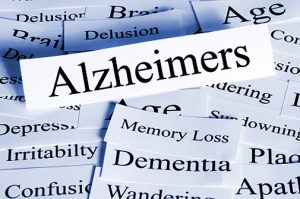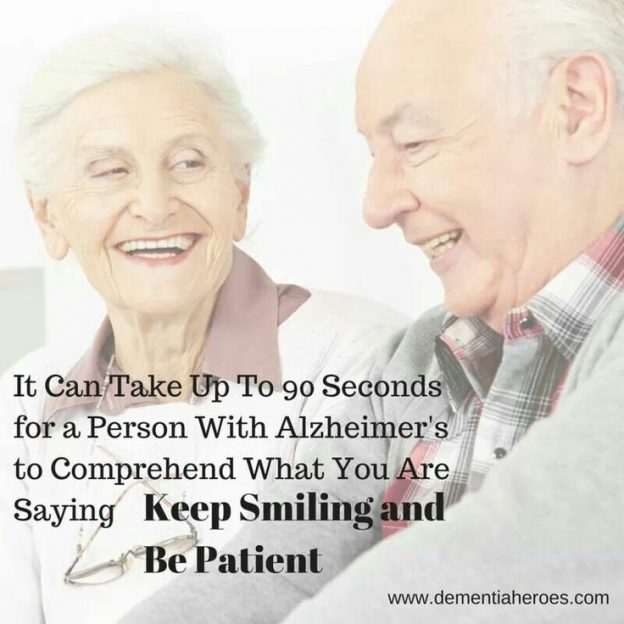What is Dementia?
Dementia is a generalized term for a decline in mental ability severe enough to interfere with daily life. Alzheimer’s is the most common type of dementia and is a disease of the brain. Alzheimer’s disease causes symptoms of dementia such as memory loss, difficulty performing daily activities, and changes in judgment, reasoning, behavior, and emotions. When a person has changing abilities as a result of dementia, communication is affected and this can cause misunderstanding and mutual frustration. (Watson, Aizawa, Savundranayagam & Orange, 2012, p. 277) These dementia symptoms are irreversible, which means that any loss of abilities cannot come back.

Helping people to live well with dementia involves good communication and the communication skills of a person with dementia will gradually decline as the disease progresses. (Young, 2012, p.149) Eventually, the person living with dementia will have more difficulty expressing their thoughts and emotions. Challenges associated with communication can lead to frustration, therefore, it can be helpful for you to understand what changes may occur and make adjustments. Anticipating these changes and knowing how to respond can help everyone communicate more effectively.
Communicating effectively with people with dementia is a problem and here are tips to help with communicating with someone affected by dementia:
- Do not interrupt the person speaking.
- Let them know it’s okay if they have trouble finding their words.
- Avoid criticizing or correcting, and repeat what they said if something needs to be clarified.
- Focus on feelings rather than facts and be aware of tone of voice and body language.
- Show respect in your speech by avoiding baby talk.
- Do not talk about your loved one like they are not in the room.
- Always assume he or she can understand what you are saying.
- Stay calm even if the conversation becomes frustrating. (Young, 2012, p. 151)
Eliminate the Myths: Here is a list of dos and don’ts for communicating with someone affected by dementia:
- Do your best to eliminate any distractions such as TV or radio
- Do keep it simple by asking one question or giving one direction at a time
- Don’t use negative statements
- Do use their first name to get their attention
- Do speak in a normal tone of voice at a normal volume
- Do ignore offensive language and try to redirect attention if the person with dementia begins using bad language
- Do encourage reminiscing if it’s enjoyable for your loved one
- Don’t be personally offended if the person who has dementia becomes paranoid or accusatory
- Don’t stop trying (Communication and Alzheimer’s | Caregiver Center, n.d.)
As the number of people affected with dementia continues to increase, there needs to be education programs on how to effectively communicate with the person affected with dementia. Communication is a tool which provides people with mechanisms to connect with others and research recommends education and training will increase successful interactions between caregivers and the person affected by dementia. (Watson et al., 2012, p.281)
The greatest impediment to communicating with people with Alzheimer’s disease is the illusion of knowledge that the person is already gone. — Michael Verde

While it’s true that a loved one with Alzheimer’s is not the same person you knew before the disease took hold, they never cease to be human or have human needs. Like all of us, they crave connection and without it, they slowly, silently wither away and die. (Alzheimer’s Myths: They’re Already Gone, 2015)
References
Alzheimer’s Myth: They’re Already Gone. (2015, November 17). Retrieved August 28, 2017, from
http://www. alzheimeris.net/2013-05-03/alzheimers-myths/
Communication and Alzheimer’s | Caregiver Center. (n.d.) Retrieved August 28, 2017, from
https://www.alz.org/cae/dementia-communications-tips.asp
The Morning Blend. (2012, June 25). Memory Bridge. Retrieved August 28, 2017, from
https://www.youtube.com/watch?v=yZQbCQxsW3o
Watson, B., Dawn Aizawa, L., Savundranayagam, M. Y., & Orange, J. (2012). Links Among
Communication, Dementia and Caregiver Burden. Canadian Journal Of Speech-Language
Pathology & Audiology, 36(4), 276-283.
Wonderlin, R. (2016, October 01). How Do I Talk to Someone With Dementia? Retrieved August
28, 2017, from https://www.youtube.com/watch?v=jfWfJy3s0B4
Young, T. (2012). Devising a dementia toolkit for effective communication. Nursing & Residential
Care, 14(3), 149-151.

